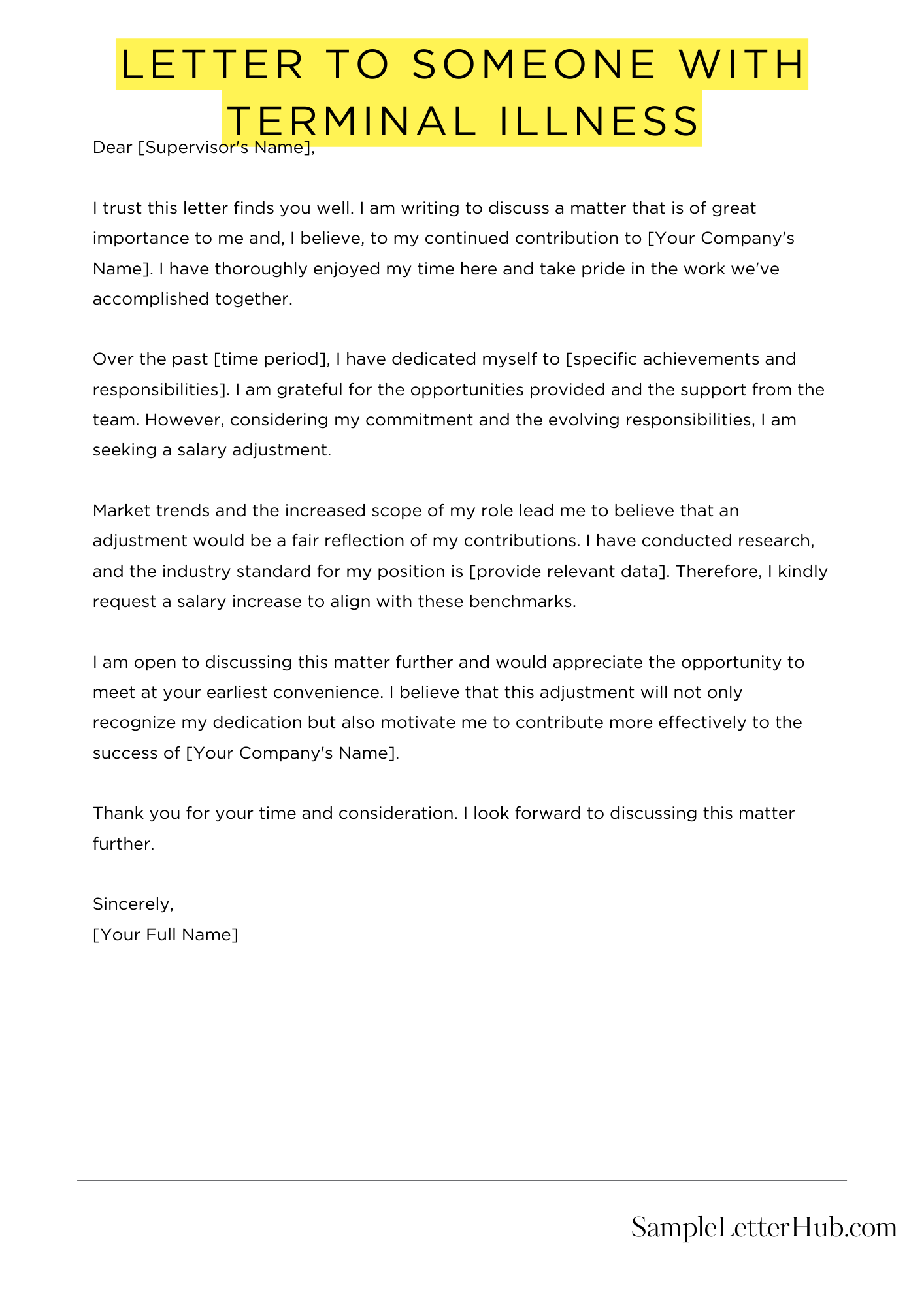A letter to someone with a terminal illness is a heartfelt message written to offer support, love, and encouragement during a challenging time. It provides an opportunity to express emotions, share memories, and offer words of comfort.
In this blog article, we will share a collection of templates, examples, and samples of letters to someone with a terminal illness. These samples are designed to help you craft a meaningful and compassionate letter that conveys your thoughts and feelings effectively.
Whether you’re a family member, friend, or caregiver, these letters can serve as a guide to help you express your love, support, and well wishes to someone facing a terminal illness.
A Letter of Comfort and Support
Dearest [Recipient’s Name],
I was deeply saddened to hear of your diagnosis. I know that this must be an incredibly difficult time for you and your loved ones.
I want you to know that I am here for you in any way I can be. If you need someone to talk to, to run errands, or to simply sit with you, please don’t hesitate to reach out.
I know that there is no easy way to face a terminal illness. But I believe that with the love and support of your family and friends, you can find strength and peace in this difficult time.
I have been thinking about you a lot lately, and I have been praying for your comfort and well-being. I know that you are a strong and courageous person, and I am confident that you will face this challenge with grace and dignity.
Please know that you are not alone. We are all here for you, and we will support you every step of the way.
With love and prayers,
[Your Name]

How to Write a Letter to Someone With Terminal Illness
Writing a letter to someone with terminal illness can be a daunting task. You want to express your sympathy and support, but you also don’t want to say the wrong thing. Here are a few tips to help you write a meaningful letter:
Be honest and direct.
Don’t sugarcoat your words or try to avoid the topic of the person’s illness. Be honest about your feelings and let them know that you’re there for them.
Offer practical help.
In addition to emotional support, you can also offer practical help, such as running errands, cooking meals, or providing transportation. Let the person know that you’re there to help in any way you can.
Share your memories.
If you have any fond memories of the person, share them in your letter. This can help them to feel connected to you and to remember the good times.
Let them know you’re thinking of them.
Even if you don’t write a long letter, let the person know that you’re thinking of them. A short note or a phone call can make a big difference.
Respect their wishes.
If the person has asked you not to visit or call, respect their wishes. They may need some time to themselves to process their illness.
Be patient.
It takes time to come to terms with a terminal illness. Be patient with the person and give them the space they need to grieve and adjust to their new reality.
Writing a letter to someone with terminal illness can be a difficult task, but it’s important to remember that you’re not alone. There are many resources available to help you, and there are many people who care about you and want to support you during this difficult time.
FAQs about Letter To Someone With Terminal Illness
What should I include in a letter to someone with a terminal illness?
Your letter should express your love, support, and sympathy. It should also let the person know that you are there for them and that you care about them.
How should I start a letter to someone with a terminal illness?
You can start your letter with a warm greeting, such as “Dear [person’s name]” or “My dearest [person’s name].” You can also start with a more personal note, such as “I’m so sorry to hear about your diagnosis” or “I’m thinking of you during this difficult time.”
What should I say in the body of the letter?
In the body of the letter, you can share your thoughts and feelings about the person’s illness. You can also share memories or stories that you have together. You can also offer your support and let the person know that you are there for them.
How should I end the letter?
You can end the letter with a warm closing, such as “Love, [your name]” or “With love, [your name].” You can also include a personal message, such as “I’m here for you, always” or “I’m thinking of you.”
What are some things to avoid saying in a letter to someone with a terminal illness?
There are some things that you should avoid saying in a letter to someone with a terminal illness. These include:
- Telling the person that you know how they feel
- Offering platitudes or clichés
- Trying to talk the person out of their illness
- Being judgmental or critical
- Making the letter all about you
